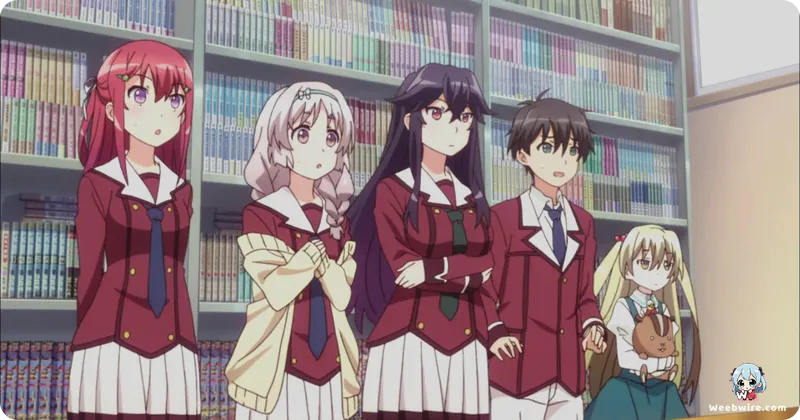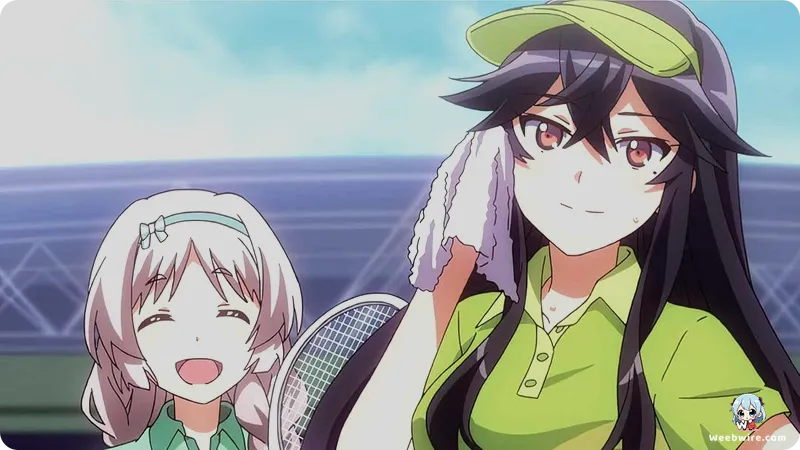Beyond Spectacle: Why Studio TRIGGER’s 'When Supernatural Battles Became Commonplace' Is a Must-Watch Masterclass in Dialogue and Subversion
3 months ago
Share this news:

Studio TRIGGER, widely recognized for high-octane action epics such as Kill la Kill and Promare, presented a notable departure from their signature style in 2014 with the release of When Supernatural Battles Became Commonplace (Inō-Batoru wa Nichijō-kei no Naka de). While sometimes overshadowed by the studio’s more action-oriented titles, this series distinguishes itself as a deceptively profound, dialogue-heavy slice-of-life comedy.
The series is built upon a clever reversal of standard battle anime expectations. The four members of the Literary Club, led by their enthusiastic, self-proclaimed chuunibyou leader, suddenly acquire incredible, god-tier supernatural abilities. However, the consistent, mundane rhythm of their daily school life ensures that these cosmic powers are primarily utilized for addressing everyday trivialities or fueling extensive philosophical discussions. This structural decision allowed the creative team to dedicate intensive focus to nuanced character dynamics and exceptionally sharp scripting.
The Technical Mastery of Episode 7
The most enduring technical achievement of the series is concentrated within a single, unforgettable sequence from Episode 7, titled "Crazy for You." This pivotal scene features the character Hatoko Kushikawa, voiced by the distinguished Saori Hayami, delivering a raw, nearly seven-minute-long, uninterrupted monologue.
The dramatic context revolves around Hatoko’s profound confusion and accumulated frustration regarding the protagonist Jurai Andou’s relentless, nonsensical chuunibyou jargon. While Jurai intends his dramatic vocabulary to be harmless, Hatoko, unable to comprehend the gap in understanding, reaches her emotional limit. She delivers a rapid-fire, emotionally devastating speech that touches upon existential themes.

The sheer technical difficulty of this performance required Hayami to maintain perfect emotional vulnerability while sustaining a breakneck pace. This cemented the scene as an instant masterpiece among voice acting experts. Crucially, the production staff, under the guidance of Director Masahiko Otsuka, deliberately minimized camera cuts and movement, maximizing the raw, visceral impact of Hayami’s delivery. This sequence remains a benchmark for acting prowess in modern anime history, showcasing immense confidence in both the script and the cast.
Satire and Character Dynamics
The protagonist, Jurai Andou, functions as a continuous source of meta-commentary. As the quintessential chuunibyou, convinced he possesses secret powers, the supreme irony of Inobato is that he actually does gain an ability, which he dramatically names ‘Dark and Dark.’ The central joke is that this power is completely useless—a harmless black flame that only burns objects he wants it to burn, effectively neutralizing any potential for dramatic conflict and brilliantly satirizing the overpowered protagonist trope.
This ridiculous naming convention extends to his clubmates’ powers, such as Tomoyo Kanzaki’s ‘Close Dread’ (time manipulation) or Hatoko’s ‘Over Element’ (elemental control). The comedy consistently arises from the absurdity of deploying these epic powers for tasks as trivial as avoiding cleaning duty or watering houseplants.
The series was directed by Masahiko Otsuka, a co-founder of Studio TRIGGER and a veteran involved in seminal works including Neon Genesis Evangelion and Gurren Lagann. Otsuka’s direction consciously avoids the hyper-stylized action typically associated with TRIGGER, opting instead for grounded character models and subtle, expressive facial animation. This shift confirms the studio’s versatility in executing nuanced, character-focused storytelling. Based on the light novel series by Kota Nozomi and illustrated by 029 (Oniku), the anime successfully captured the delicate emotional and romantic undercurrents of the source material. The show’s title itself is a piece of dry, self-aware humor: supernatural elements are indeed commonplace, but the promised battles never truly materialize. Its lasting appeal rests on sharp wit, complex character interactions, and its singular, breathtaking display of emotional depth.